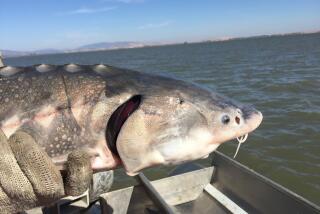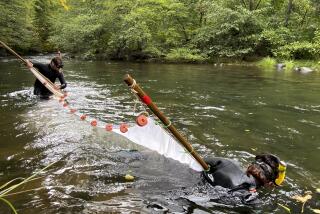Clash Over Fishing Roils Scenic Bay
- Share via
BARTLETT COVE, Alaska — For years the National Park Service looked the other way when fishermen illegally took tons of salmon, halibut, crab and shrimp from Glacier Bay National Park.
The local Tlingit Indians have plied these bountiful waters in search of food since before the last Ice Age. Commercial fishing predates the turn of the century.
Now the future of fishing here is in doubt as the Park Service prepares to enforce a ban on subsistence nets and adopt rules that would place some restrictions on commercial fishing, pending a study of its effects.
Some fear the study could be manipulated to justify an end to commercial fishing in park waters. The park catch contributes an estimated $10.5 million annually to the economy of southeast Alaska.
Enforcement of the subsistence ban also could lead to confrontations between park rangers and the Tlingit, who consider their right to fish, hunt and gather food here inalienable.
*
“They will go into Glacier Bay notwithstanding those regulations,” said Robert Loescher, a Tlingit who has testified in Congress against the subsistence ban. “The people will undertake their traditional activities.”
The ban on subsistence fishing would affect a few hundred people at most. But for the Tlingit, Glacier Bay is more than a source of food. It is a source of cultural and spiritual fulfillment.
“The Hoonah Tlingits have used the park from time immemorial,” Loescher said. “We have documented that. What we are trying to do is re-establish our cultural rights.”
Environmentalists are unusually divided over the issue.
Some say fishing boats have no place in a marine park frequented by endangered humpback whales and a threatened species of sea lion. Others say commercial and subsistence fishing should be allowed to continue at current levels while long-term studies are conducted.
Jack Hession, the Sierra Club’s Alaska spokesman, said Glacier Bay is a unique place where wildlife should be allowed to live without interference from man.
He rejects the notion that the Tlingit have a paramount right to continue their role as predators in such as rare environment.
“Every other national park probably has a neighboring Native American group of one sort or another that had fishing and hunting grounds in these areas,” Hession said. “Congress decided, on balance, that there need to be some areas exempt from these activities--from everybody, not just Native Americans.”
But John Sisk, executive director of the Southeast Alaska Conservation Council in Juneau, says an exception is justified for Glacier Bay.
“I’m sure Glacier Bay couldn’t accommodate unbridled fishing, but we think there’s a lot more room for the bay to accommodate different fishing uses than is normally the case in a national park.”
*
Glacier Bay National Park and Preserve covers more than 3.2 million acres, including some of the world’s most spectacular tidewater glaciers, about 65 miles northwest of Juneau at the north end of Alaska’s panhandle.
There is no hard evidence that the fishing has harmed what is one of the most wildlife-rich areas of the world. So until recently, Park Service officials saw no need to rock the boat.
But a dispute with the state and a lawsuit by conservationists finally forced the agency to acknowledge that much of the fishing violates federal law. Only sport fishing is legal.
The new regulations are awaiting final approval from the Interior Department in Washington, which has been sitting on them for months.
Congress might act as well. Alaska’s delegation was unsuccessful this year in trying to pass legislation to make commercial and subsistence fishing legal in the park indefinitely. It plans to try again next year.
The regulations would ban commercial fishing in the park’s wilderness waters, but allow it to continue elsewhere for at least seven years, pending the study.
That would still allow fishing in much of the park, including most of the bay itself and the rich waters of park’s outer coast, Cross Sound and Ice Strait--a major thoroughfare for salmon heading to the spawning grounds of the Alexander Archipelago.
Fishing groups say there is no reason to restrict commercial fishing.
“It’s a very, very productive area,” said Dale Kelley, who heads the Alaska Trollers Assn. in Juneau. “It’s very healthy. There’s not an environmental problem.”
But Jensen and others say the fishermen cannot prove their work is having no effect on marine mammals and on fish runs elsewhere.
“You take some 3 million-plus pounds of fish--be it halibut, crab, salmon or whatever--out of some fairly concentrated areas, I expect that there are some effects,” he said. “But what they are we don’t know.”
Jensen also notes that Glacier Bay was preserved in 1925, in part for scientific study.
*
While declines in fish runs and marine mammals have been documented throughout much of the Pacific Rim, no place has been made off-limits to all fishing, Jensen said. “Places like Glacier Bay that can be protected ought to be.”
Under the subsistence regulations, gathering of berries and some shellfish would still be allowed. But all fishing with nets and all hunting would be banned.
Loescher says the Indians are being singled out. Sports fishermen, tour boats and commercial fishermen have access to the park. “And now subsistence fishing is prohibited. It’s totally wrong.”
Loescher is executive vice president of natural resources for Sealaska Corp. in Juneau, the Indian-owned land corporation for southeast Alaska formed under the Alaska Native Claims Settlement Act. He estimates 150 to 200 people are involved in subsistence activities in the park, most from the village of Hoonah, 30 miles south of park headquarters at Bartlett Cove.
But a ban on subsistence would not cut off the Tlingits’ supply of Glacier Bay fish, for many of them also fish commercially--a fact that further complicates the issue.
*
“They take enough out of their commercial catch for whatever their needs are for their family and associates for their traditional use,” Jensen said. “So when you talk to them about subsistence, they can’t separate it in their mind from their commercial take.”
“It’s a very harsh climate and environment. The seasons govern when the resources are available. Nature restricts the number of people who can use the park.”
Though tolerated, subsistence fishing has never been legal in park waters. Commercial fishing was banned in all national parks in 1983, except for a few which Congress exempted.
In 1989 the Alaska Fisheries Board issued subsistence permits and set seasons for the waters of Glacier Bay. The Park Service objected, saying the state had no jurisdiction over park waters.
The wrestling match over rights continues. In 1990, conservationists brought suit to enforce both bans.
“We feel there is adequate fishing allowed in the coastal waters for commercial and subsistence uses,” said Nicole Evans of the Alaska Wildlife Alliance. “It doesn’t need to occur in Glacier Bay.”
More to Read
Sign up for Essential California
The most important California stories and recommendations in your inbox every morning.
You may occasionally receive promotional content from the Los Angeles Times.










